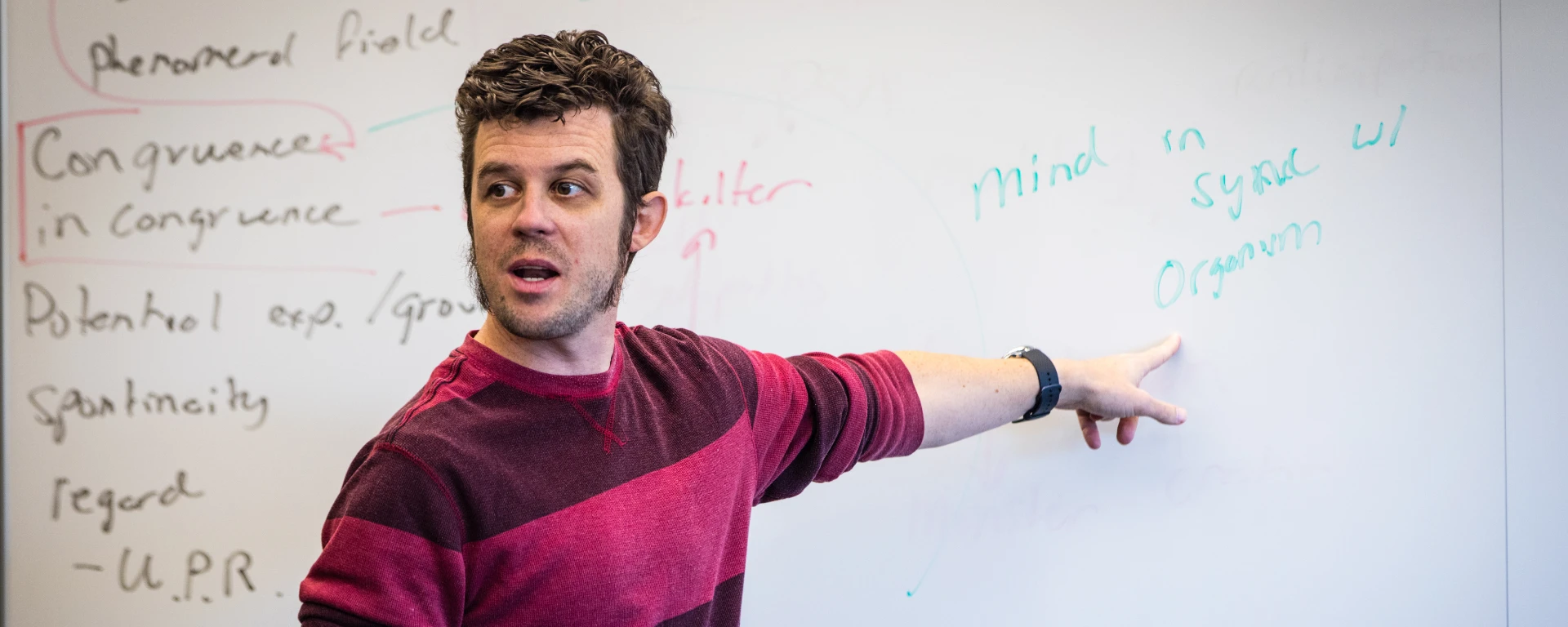
Are you driven to understand the human mind and help others transform their lives through therapy? A psychology major could be your first step toward a fulfilling career as a therapist, which also requires persistence through graduate education and licensure. Whether you’re drawn to counseling individuals through life transitions, treating mental health conditions or conducting research to advance therapies, becoming a therapist offers meaningful opportunities to make a difference.
At Northwest Missouri State University, our psychology major gives you the academic preparation, research opportunities and clinical experiences to help you launch your career – and succeed in it. In this blog, we’ll explore how to become a mental health therapist through Northwest’s psychology program.
Psychology offers a fascinating glimpse into the study of human thoughts and behaviors. By studying psychology, you’ll gain valuable insights into what drives human behavior, uncover hidden motives behind actions and understand the thought processes that shape decisions.
In a psychology degree program, you’ll examine the interplay between biological factors like genetics and brain chemistry. You’ll also learn how social influences contribute to human development, cognitive abilities, relationship patterns and personality formation. This knowledge prepares you to help others as a therapist and understand yourself and those around you on a deeper level.

Northwest offers a bachelor’s degree as the first step to becoming a mental health therapist. Whether you’re looking for a strong research foundation or a flexible approach to psychology, our program provides the knowledge and experience you need. We offer a:
This degree path features hands-on learning through opportunities that include research, internships, study abroad and faculty mentorships with professors from clinical backgrounds. Whatever path you choose, our psychology program prepares you for graduate studies on your path to a career of helping others.
A psychology degree could be a great fit if you’re naturally curious about human behavior and motivated to help others through life’s challenges. Successful psychology students typically enjoy analyzing problems, listening to others’ experiences and applying scientific principles to understand the human mind. You’ll excel in this program if you value both quantitative research skills and qualitative human insights.
Here are the essential competencies you should develop:
The path to becoming a therapist requires strong ethical boundaries and exceptional interpersonal skills. If you find yourself fascinated by why people think, feel and behave the way they do – and you’re committed to making a difference in other people’s lives – Northwest’s psychology program is for you.
Northwest offers a uniquely supportive environment for students pursuing careers in therapy. Our small class sizes foster a tight-knit community where you’ll build relationships with both peers and professors. Unlike larger institutions where undergraduates wait years for hands-on experiences, at Northwest, you can engage in partnered research, community volunteer opportunities and clinical observations.
Our dedicated faculty experts – many recognized as national and international experts in their fields – are available for one-on-one mentoring, research collaboration and academic guidance. They’re invested in your success – academically, personally and professionally – and will help you prepare to launch your career as a therapist.

Northwest’s psychology curriculum lays a foundation for becoming a therapist. The multidisciplinary approach balances quantitative scientific methods with qualitative human science perspectives. You’ll explore everything from cognitive and biological psychology to theoretical and philosophical approaches. Learn from faculty who are actively practicing in their specialties.
You’ll also benefit from opportunities outside of the classroom like our internationally recognized Psi Chi honor society. The Cognitive and Education Psychology Lab and the Theoretical Psychology Research Group will help you develop research skills vital for graduate studies in therapy. Through guest speaker events, you’ll network with experienced therapists and researchers, opening doors to internships and job opportunities. Experiences like these will prepare you for real-world practice as a therapist.
As you explore how to become a therapist, you might want to also look into other career options for psychology majors. Northwest graduates use their skills in human behavior, communication and problem-solving to succeed in a variety of fields beyond traditional therapy. Here are some additional career opportunities:
Apply psychology principles to business strategies and customer engagement:
Share knowledge and empower others through teaching and information management:
Help organizations build strong teams and foster a positive work environment:
Support communities through advocacy and program development:
Make a direct impact on people's lives by providing support, guidance and rehabilitation services:
Use data and analysis to drive understanding and innovation:
No matter which path you choose, your psychology degree from Northwest gives you the skills to make a difference in a variety of fields. See how Northwest’s psychology major can help you reach your career goals.
Explore Northwest's Psychology Major

At Northwest, small class sizes and a close-knit learning environment give you opportunities typically reserved for graduate students. From your first year, you’ll collaborate with faculty on research, build mentoring relationships with professors who know you by name and gain hands-on clinical experience before you graduate. This personalized approach fast-tracks your professional growth, giving you a competitive edge as you prepare for a career in therapy or beyond.
Join a supportive community where professors are dedicated to your success and award-winning student organizations welcome you from day one. Our Psi Chi chapter has been recognized as a Model Chapter five times in six years (an honor given to just 4% of chapters worldwide). The Behavioral Science Association provides mentorship, leadership roles and research opportunities. You’ll build relationships with peers, faculty and community leaders that extend well beyond campus.
At Northwest, you don’t just study psychology – you practice it. Design and conduct original research, present your findings at regional conferences and gain hands-on experience through profession-based learning internships. These real-world opportunities prepare you for a career in therapy and give you a competitive edge in the field.
Join the Behavioral Sciences Association’s “I Will Listen” movement and take an active role in changing community attitudes toward mental health. Connect with community members, develop your public advocacy skills, and help break the stigma surrounding mental health.
Learn how therapy and mental health practices vary across cultures, deepening your understanding of human behavior through opportunities outside the classroom. Work alongside faculty in countries like Ireland and Switzerland, engage with international professionals and gain cross-cultural competence to prepare for your future.
Ready to transform lives as a therapist? Start your path at Northwest, where we’ll guide you through every step of becoming a mental health professional who makes a difference. Explore our major in psychology.